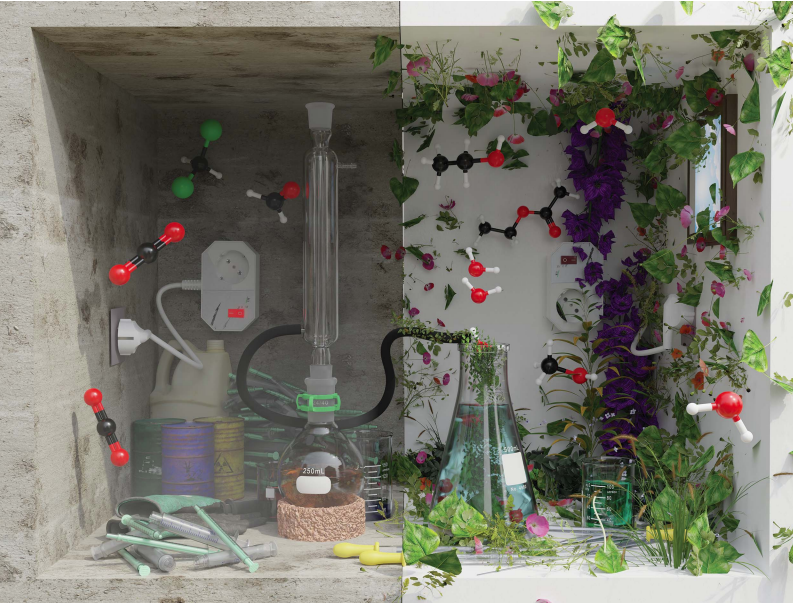University of Groningen frontrunner in green labs movement
Scientists are essential to society and contribute to addressing major challenges such as the climate crisis. Although scientific research often leads to important breakthroughs and insights, laboratory research also involves unintended negative environmental impact, such as high energy consumption, the production of hazardous waste, and the use of resources.
Advocating for systemic change
In the Royal Society of Chemistry Sustainability Journal, Nobel prize winner Ben Feringa and his colleagues share a perspective article with a comprehensive literature review and a case study at the University of Groningen over the past years. The article was written with the intention to enhance lab sustainability and offer advice for other researchers worldwide looking to do the same. The publication advocates for leadership and systemic change in laboratory practices and research approaches.

Small steps, big impact
Feringa and his colleagues demonstrate that small steps can lead to significant improvements. By implementing simple measures like temperature settings, closing fume hoods, sharing chemical supplies, and developing standard operating procedures, many labs have already succeeded in reducing their emissions and waste streams. Additionally, they are undertaking larger projects such as using gloves made from recycled materials, washing pipette tips, and reusing solvents. Another strategy involves rethinking the organization of research projects to prevent waste from the outset and re-evaluating chemical reactions that were considered acceptable 20 years ago, but could now be performed more sustainably. Combining these kinds of measures can have a big impact, as is shown in the UG case study which resulted in annual savings of €398,763 and the equivalent of 477.1 tons of CO2.
LEAF programme
Green Labs UG, chaired by Gael Schaeffer, has gathered extensive data on the consumption patterns of wet and dry labs over recent years. Their approach includes utilizing LEAF, a software system that calculates lab emissions and identifies potential areas for improvement. Labs can join the LEAF initiative by contacting the LEAF coordinator Thomas Freese (t.freese@rug.nl).
Guidebook for sustainable labs
A comprehensive guidebook with practical suggestions for lab users and lab managers was published internally in 2023. This guidebook shows, for example, what type of sustainable chemicals to use, where it is better to replace plastic with glass, what to do with old or damaged lab equipment and what to do with old lab coats. Since early 2024, this guidebook can also be found online and is already frequently used by the UMCG, Utrecht University, Wageningen University, University of Amsterdam and Washington State University for making their laboratories more sustainable.
Setting the example
The more labs join the network, the better, because as the researchers state in their paper: ‘We hope that we can initiate systemic change, so that we as researchers can set an example for the rest of society’.
Authors

Ben Feringa, Jacobus van 't Hoff Distinguished Professor of Molecular Sciences. Manager of several silver accredited laboratories.

Thomas Freese, PhD in the Feringa group and LEAF coordinator.

Nils Elzinga, Coordinator UG Green Office.

Michael Lerch, Assistant Professor Molecular Active Systems. Manager of a silver accredited laboratory.

Matthias Heinemann, Professor Molecular Systems Biology. Manager of a bronze accredited laboratory.
In collaboration with:
| Last modified: | 04 June 2024 3.54 p.m. |
More news
-
03 April 2025
IMChip and MimeCure in top 10 of the national Academic Startup Competition
Prof. Tamalika Banerjee’s startup IMChip and Prof. Erik Frijlink and Dr. Luke van der Koog’s startup MimeCure have made it into the top 10 of the national Academic Startup Competition.
-
01 April 2025
NSC’s electoral reform plan may have unwanted consequences
The new voting system, proposed by minister Uitermark, could jeopardize the fundamental principle of proportional representation, says Davide Grossi, Professor of Collective Decision Making and Computation at the University of Groningen
-
01 April 2025
'Diversity leads to better science'
In addition to her biological research on ageing, Hannah Dugdale also studies disparities relating to diversity in science. Thanks to the latter, she is one of the two 2024 laureates of the Athena Award, an NWO prize for successful and inspiring...
